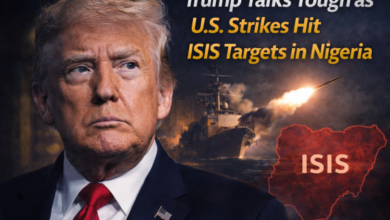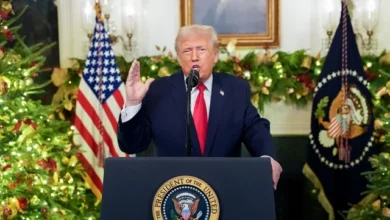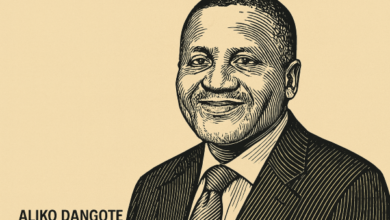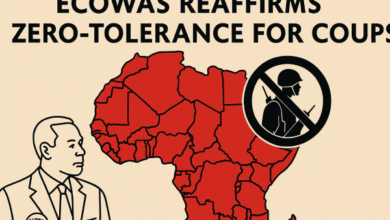ECOWAS: X-raying the existential threat of Mali, Niger, Burkina Faso exit
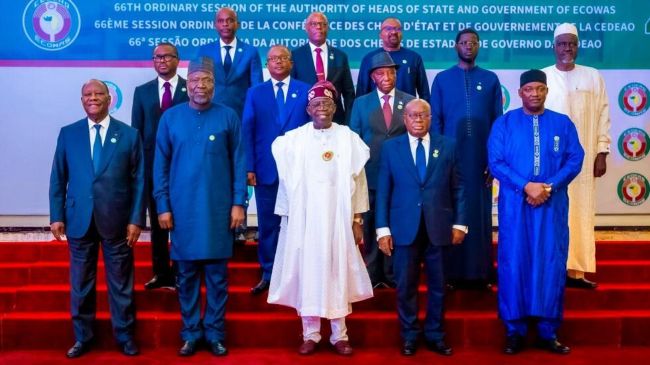 By Mark Longyen
By Mark LongyenThere is an emerging reality that the Economic Community of West African States (ECOWAS) is set to lose three of its founding members – Mali, Burkina Faso, and Niger Republic, in one fell swoop.
Founded almost 50 years ago on May 28, 1975 to promote the economic growth and political stability of West Africa’s subregion, the bloc has had a chequered achievement record.
On Jan. 28, 2024, however, the aforementioned three landlocked countries of the Sahel, the semi-arid region south of the Sahara Desert, shockingly announced their exit from the subregional bloc in a joint statement.
The three states notified ECOWAS that they would withdraw their membership within one year, which is the stipulated timeline for any country wishing to quit the bloc to make its intention known.
ECOWAS: Bukina Faso, Mali, Niger get Jan. 29, 2025 deadline
The Sahel states had hitherto been hit by violent extremism and terrorism orchestrated by marauding Islamist jihadists emanating mostly from their initial hotbed in North Africa and the Middle-East.
Notably, this was one of the reasons that the rebelling military rulers gave for seizing power earlier in the their countries.
They accused ECOWAS leaders of being too aligned with Western powers, especially France, at the detriment of their own countries.
The trio said their decision to exit the bloc was also in protest against ECOWAS’ hardline position over the coups in their countries, the imposition of sanctions, as well as the threat of military invasion.
The putchists have aligned with Russia to fight the armed jihadists, who are currently orchestrating violent extremism and terrorism against their countries by severing all preexisting Western military alliances and presence in their countries.
The military rulers had seized power following a series of coups between 2020 and 2023, with ECOWAS initially responding by imposing sanctions against them, demanding a quick restoration of civilian rule, and threatening to use military force, before backing down.
To demonstrate that they were prepared to match their words with actions, the three countries later went on to sign a tripartite defence treaty and a new confederation – the Alliance of Sahel States (AES), as an alternative to ECOWAS.
They have now declared their decision to quit ECOWAS as “irrevocable” barely one year after declaring their intention to call it quits with the bloc -a clear indication that the three countries will soon formally exit the bloc.
This is in spite of ECOWAS leaders’ lifting of some of the sanctions imposed earlier and the deployment of germane diplomatic efforts to enable them to drop their threat to exit.
The far-reaching implication of the move by the Sahel states is not lost on ECOWAS leaders, who feel that it is a major blow to the bloc and could have serious security consequences, if they do not rescind the decision.
It was, perhaps, in light of this reality that António Guterres, United Nations Secretary-General, once said, “If nothing is done, the effects of terrorism and organised crime in the Sahel region will be felt far beyond the region and the entire African continent.”
Analysts are of the view that the terrorist groups, which have made the Sahel region the new global epicentre of terrorism, could spread through Sub-Sahara’s lengthy porous borders, cascade down to coastal West Africa, compromise and overwhelm the subregion’s overall security architecture.
In July, 2024, for instance, Dr Omar Touray, President of the ECOWAS Commission, warned that ECOWAS was facing an existential threat, risked disintegration and worsening insecurity, if the three countries refused to reverse their decision.
He said that the move by the Sahel’s military rulers could disrupt the freedom of movement of people across the region and undermine ECOWAS’ collective efforts to combat regional insecurity, especially in intelligence sharing.
“Our region is facing an existential threat and the risk of disintegration. We must take a more vigorous approach and develop a forward-looking contingency plan,” Touray said.
The benevolent efforts ofthe ECOWAS Commission, as well as the Authority of ECOWAS Heads of State and Government, have seemingly failed to yield the desired diplomatic dividends, as the latter subsequently approved the historic exit of the military-run states during their recent 66th Summit held in Abuja in Dec. 2024.
The ECOWAS leaders declared in a communique issued at the end of the summit that they respected the three Sahel countries’ decision to leave, but still offered them a caveat transitional period of six months.
According to them, from Jan. 29 to July 29, 2025, the trio can be readmitted to the bloc, should they decide to rejoin the community -which smacks of frustration and desperation of sorts.
The summit’s final communique reads in part thus: “The Authority takes note of the notification by the Republic of Mali, the Republic of Niger and Burkina Faso of their decision to withdraw from ECOWAS and acknowledges that in accordance with the provision of Article 91 of ECOWAS Revised Treaty of 1993, the three countries will officially cease to be members of ECOWAS from 29th January 2025.
“The Authority decides to set the period from 29th January 2025 to 29th July 2025 as a transitional period and keep ECOWAS doors open to the three countries.
“The Authority, in this regard, extends the mandate of H.E. Faure Essozimna Gnassingbé, President of the Togolese Republic and H.E. Bassirou Diomaye Diakhar Faye, President of the Republic of Senegal, to continue their mediation role up to the end of the transition period to bring back the three countries.
“The Authority, without prejudice to the spirit of the continued diplomatic engagements, directs the President of the Commission to launch the withdrawal formalities after the deadline of 29th January 2025 and to draw up a contingency plan covering all areas.
“The Authority directs the Council of Ministers to convene an Extraordinary Session during the second quarter of 2025 to consider and adopt both the separation modalities and the contingency plan covering political and economic relations between ECOWAS and the Republic of Mali, the Republic of Niger and Burkina Faso.”
Earlier at the opening of the summit, Touray had said that the three countries’ impending exit was “disheartening,” but commended the ongoing mediation efforts.
Almost simultaneously, the AES leaders, at a ministerial-level meeting in Niger’s capital, Niamey, declared in a joint statement that their decision to quit ECOWAS was “irreversible,” which further reconfirmed the straining of their relations with ECOWAS.
Assimi Goïta, Mali’s military ruler and AES chairman, went further to announce visa-free travel and residency rights for ECOWAS citizens, greenlighting their right to “enter, circulate, reside, establish and leave” the new bloc’s territory.
Goïta explained that their olive branch offer was in the spirit of friendship, and to strengthen centuries-old ties among African people.
ECOWAS is said to be working out whether it will impose restrictions on people and goods coming from the three departing states, and also how the two blocs should work together in future.
Analysts argue that the imminent departure of the three countries will be a big blow, with near catastrophic and disastrous effects on ECOWAS’ survival, which underscores the existential threat it portends for the bloc, going forward.
For instance, it is estimated that the bloc will lose about 76 million of its 446 million population, and more than half of its total geographical land area, which is perceived as a precursor to ECOWAS disintegration.
Adib Saani, a foreign policy and security analyst at the Jatikay Center for Human Security and Peace Building, Accra, Ghana, said it is better to have a united ECOWAS than to be without it.
“If ECOWAS were to disintegrate, it would be chaotic and disastrous for all of West Africa. Businesses would come to a halt. If ECOWAS doesn’t exist, it means the borders are shut.
“You would need visas, and you have to go through a protracted customs procedure to get goods in and out. I think that it is better with ECOWAS than without ECOWAS,” he said.
Saani noted that, in spite of its many challenges, ECOWAS still remains the most viable union to foster both economic growth and political stability in West Africa.
“ECOWAS still holds a certain amount of military leverage to restore some level of security within the subregion,” he said.
He recalled that when Sierra Leone and Liberia faced security crises during their civil wars, ECOWAS deployed troops to help tackle those situations.
“It was ECOWAS that intervened to ensure that peace was restored in these countries and many others over the years,” he added.
Fidel Owusu, an international relations and security analyst, while corroborating Saani’s view, noted that ECOWAS took such past bold initiatives when the whole world was bowing out, and solved the problems.
Owusu said that in order to ensure the future of the bloc, ECOWAS has to undergo further reforms and produce strong leaders, who are committed to its aspirations.
He said that ECOWAS did not handle the Mali, Niger and Burkina Faso situation very well, stressing that the threat to invade Niger after its military takeover, was particularly a bad move.
“They knew very well that they could not prosecute, and that really rendered them a toothless bulldog.
“This move was the final straw that triggered Mali, Niger and Burkina Faso to break away from the bloc in January, 2024,” Owusu said.
Adama Gaye, a former ECOWAS Director of Communications, partly blamed the bloc’s leadership for the Mali, Niger, Burkina Faso standoff.
According to him, ECOWAS leaders are pushing the military-led countries to hold free and fair elections, yet several other ECOWAS member states are themselves not true democracies.
“ECOWAS should make effort to avoid becoming an institutional laughing-stock. How can you implement this when most of the other countries claiming to uphold the demand for democracy are not themselves true democracies?” He queried.
Speaking at a Public Lecture organised by the News Agency of Nigeria (NAN) recently, Dr Mohamed Ibn Chambas, pioneer ECOWAS Commission President and the African Union’s Chief Mediator on Sudan, identified some of the factors fueling insecurity in the Sahel region, and engendering ECOWAS’ existential threat.
He said that weak governance, vast ungoverned spaces in the zone, the Libyan/Sudanese crises, drying/shrinking Lake Chad, and external forces’ terrorism financing, among others, were responsible for the protracted carnage.
Chambas said that weak regional cooperation has further taken a toll on the subregion’s security challenges, and suggested that stepping up regional cooperation initiatives was the panacea to the impending threat.
“The issues of terrorism financiing and supply network should be effectively cut off or addressed. We see the terrorists riding hundreds of thousands of motorbikes. How are they getting these and the fueling? These are what we should interrogate,” he said.
ECOWAS Commission President, Touray, on his part, noted that terrorist attacks, which were initially confined to Mali, Burkina Faso and Niger in the Sahel, and Nigeria in the Lake Chad Basin, had multiplied and were threatening coastal West African countries.
“Initially confined to certain countries in the Sahel (Mali and Niger) and the Lake Chad Basin (Nigeria), terrorist attacks have multiplied and spread to other countries (Burkina Faso) and are now a real threat to coastal countries (Benin, Côte d’Ivoire, Togo),” he said.
He said that in view of the prevailing escalating violent extremism and terrorism, West African countries’ leaders were already working on setting up a 5000-man ECOWAS Standby Force to nip the threat in the bud.
Chairman of the ECOWAS Authority of Heads of State and Government, Nigeria’s President Bola Tinubu, noted that the security of the Sahel region was crucial for the survival of ECOWAS and Nigeria.
Tinubu said his administration had deployed a combined multifaceted approach, which comprised kinetic and non-kinetic strategies, to tackle the threat of violent extremism and stem the tide of their ripple effects across West Africa.
Analysts posit that in light of the ECOWAS subregion’s prevailing existential threat triggered by unprecedented upsurge in terrorism scourge, the exit of the Sahel states would pose a handful of challenges for ECOWAS.
According to them, curbing this menace requires addressing the root causes of extremism by banishing extreme poverty and inequality in member states, scaling up the tracking of terrorists, cutting off their sources of funding, among others.
Tackling sub-Saharan Africa’s security challenges and the existential threat they pose, given the imminent exit of the Sahel three, therefore, requires a mixed bag of regional collaborative strategies in liaison with international partners, especially in terms of intelligence sharing and resource mobilisation, among others, to achieve success.
News Agency of Nigeria (NAN)







